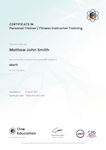
Bodyguard Training - CPD Certified
CPD UK Certified | Advanced Audiovisual Lessons | Tutor Support included | Special Price
One Education
Summary
- Exam(s) / assessment(s) is included in price
- Tutor is available to students
Add to basket or enquire
Overview
The Bodyguard Training is all you need to advance your career in the relevant fields.
Enrol now to discover everything you need to know about the Bodyguard Training and the skills to improve your talents in this field and be confident in your knowledge bucket with One Education as your right hand!
Meet the Accreditation
The CPD Certification Service (CPD UK) assures the Bodyguard Training course training and learning activities are relevant, reliable, and upto date.
Expert Support
Dedicated tutor support and 24/7 customer support are available to all students with this premium quality course.
Key Benefits
- Learning materials of the Design course contain engaging voiceover and visual elements for your comfort.
- Get 24/7 access to all content for a full year.
- Each of our students gets full tutor support on weekdays (Monday to Friday)
CPD
Course media
Description
Course Curriculum:
Here is a curriculum breakdown of the Bodyguard Training course:
Module 01: Introduction to Bodyguard Training
- Who Is a Bodyguard?
- Roles and Responsibilities
- Close Protection in the UK
- What You Need to Become a Bodyguard
- How to Become a Professional Bodyguard
- Training Requirements
- Qualities You Must Possess
- Conflict Management
- Interpersonal Skills
Module 02: Personal Security
- Definition of Personal Security
- Responsibility for Own Security
- Security Commensurate with Threat
- Constant Awareness
- Limiting Information
- Patterns and Habits
- Briefing the Principal
- Home Security Advice
Module 03: Laws and Legislation
- UK Licensing
- The Security Industry Authority (SIA)
- Standards in Training
- Performance Criteria
- Range Statement
- Knowledge Criteria
- Core Competency Training
Module 04: Threat Assessment and Risk Management
- Threat Assessment
- Why Do You Need Threat Assessment?
- Salting the Step
- Types of Threat Assessment
- Threat Pyramid
- Attentional Control
- Profiling
- Risk Assessment
- Motivation of Possible Attackers
- Possible Dangers
Module 05: Operational Planning
- Preliminaries or Task
- Ground
- Situation
- Mission
- Execution
- Service Support
- Command and Signals
- The Close Protection Team
- Security Objectives
Module 06: Behavioural Intelligence
- Identifying the Human Danger Factor
- Protective Intelligence Investigation
- Intelligence Analysis
- Psychological Perspectives
- Identifying the Dangerous Person in a Crowd
- Assessments
Module 07: Anti-Ambush Drills
- Ambush Attack
- Fatal Mistakes
- Basic Principles
- Anti-Ambush Drill Techniques
- Stationary Cut-Off (Roadblock)
- Defensive Tactics
- Two Car Drills
- Blocked Front and Rear
- VIP Vehicle Disabled
- Ramming
- Kerb Jump
- Motorcycle Attacks
Module 08: Searching Techniques
- Efficient Searching
- Search Routine
- Searching People
- Bag Searches
- Hiding Places on a Person
- Effectively Searching Premises
- Degrees of Premises Search
Module 09: On Foot Protection
- Foot Protection
- Alertness
- Arc of Vision
- Options to Consider in Foot Formation (Regarding Possible Threat Situations)
- Body Protection Formation
- Solo Bodyguard
- Two-Man Team
- Three-Man Team
- Four-Man Team
- Open Formation (Box)
- Close Formation (Box)
- Diamond Formation
- Box Formation
- Seven Man Circle Formation
- Fence Line Formation Movement
- Moving Between Two Buildings via Corridors or Passageways
- Moving in Escalators, Malls, Office, Buildings, Airports etc.
- Staircases
- Lifts
Module 10: Physical Intervention
- What Is Physical Intervention?
- Non-Restrictive Physical Intervention
- Restrictive Physical Intervention
- When Is Physical Intervention Necessary?
- Physical Intervention Training
- Different Types of Physical Intervention
- Risks of Physical Intervention
Module 11: Vehicle Escort Procedures
- General Rules
- Choice of Vehicle
- Safety on the Road
- Two Car Drills
- Speed
- Convoy Control
- Laying Procedure
- Additional Vehicles
- Communication
Module 12: Route Reconnaissance
- Introduction
- Security Considerations in General
- Principles of Route Selection and Planning
- Points of Vulnerability
- Checking the Route Thoroughly
- Targets at High Risk
- Looking for Communication Gaps
- Close Protection Drivers
- Diver Training
Module 13: Surveillance and Basic Anti Surveillance Techniques
- What Is Surveillance?
- Observation
- Levels of Awareness
- Gathering and Controlling Information
- Electronic Surveillance
- Mobile Surveillance
- Preparation
- Surveillance Vehicle
- Concealment Techniques
- Foot Following
- The Urban Observation Post (OP)
Module 14: Firearms and Explosive Handling
- How Guns Work
- Shooting Techniques
- Anatomy of a Sling
- How to Attach a Rifle Sling
- How to Adjust a Sling
- Transition from a Shoulder Carry to Solid Standing Shooting Position
- Gun Safety Tips
- Bomb Protection and Evacuation
- Explosive Search
- Improvised Explosive Devices (IEDs)
Module 15: Protectee Variations
- VIP Protection
- Family Protection Details
- Spouse
- Children to Age Twelve
- Teenagers
Module 16: Medical Emergency Assistance
- Medical Emergencies
- Primary Survey
- Airway
- Bleeding
- Circulation
- Shock
- Secondary Survey
- Rescue Breathing Resuscitation
- Control of Bleeding
- Treatment for Shock
- Choking
- Heart Attack
- Stroke
- Burns
- Medical Kit
Module 17: How COVID-19 Affected Close Protection Services
- COVID-19 and the Guarding Industry
- How Close Protection Works in Practice?
- Guarantee Your Safety with Close Protection Services
- Inspection in Advance
- Making Advance Arrangements
- Defence Responsibilities
Course Assessment
To simplify the procedure of evaluation and accreditation for learners, we provide an automated assessment system. Upon completion of an online module, you will immediately be given access to a specifically crafted MCQ test. The results will be evaluated instantly, and the score will be displayed for your perusal. For each test, the pass mark will be set to 60%.
When all tests have been successfully passed, you will be able to order a certificate endorsed by the Quality Licence Scheme.
CPD Accredited Certification from One Education
After successfully completing this Bodyguard Training course, you will qualify for the CPD Certification Service (CPD UK) certified certificate from One Education.
Exam & Retakes:
It is to inform our learners that the initial exam for this online course is provided at no additional cost. In the event of needing a retake, a nominal fee of £9.99 will be applicable.
Certification
Upon successful completion of the assessment procedure, learners can obtain their certification by placing an order and remitting a fee of £9 for PDF Certificate and £15 for the Hardcopy Certificate within the UK ( An additional £10 postal charge will be applicable for international delivery).
Who is this course for?
This Bodyguard Training course is designed to enhance your expertise and boost your CV. Learn key skills and gain a certificate of achievement to prove your newly-acquired knowledge.
Requirements
This Bodyguard Training course is open to all, with no formal entry requirements.
Career path
Upon successful completion of the Bodyguard Training Course, learners will be equipped with many indispensable skills and have the opportunity to grab.
Questions and answers
Currently there are no Q&As for this course. Be the first to ask a question.
Reviews
Currently there are no reviews for this course. Be the first to leave a review.
Legal information
This course is advertised on reed.co.uk by the Course Provider, whose terms and conditions apply. Purchases are made directly from the Course Provider, and as such, content and materials are supplied by the Course Provider directly. Reed is acting as agent and not reseller in relation to this course. Reed's only responsibility is to facilitate your payment for the course. It is your responsibility to review and agree to the Course Provider's terms and conditions and satisfy yourself as to the suitability of the course you intend to purchase. Reed will not have any responsibility for the content of the course and/or associated materials.



